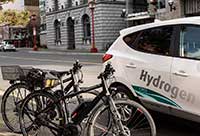
As part of the organization’s commitment to reduce greenhouse gas (GHG) emissions within corporate operations, the Capital Regional District (CRD) undertook the Zero Emissions Fleet Initiative (ZEFI), within its vehicle fleet.
In September 2017, the Federation of Canadian Municipalities’ Green Municipal Fund approved a $350,000 pilot project grant to fund the CRD’s Zero-Emissions Fleet Initiative. The project was a multi-year, federally-funded partnership between the CRD, the University of Victoria’s Institute for Integrated Energy Systems, and the BC Ministry of Energy, Mines and Petroleum Resources.
The project had three primary areas of focus:
- zero emission vehicle (ZEV) pilot in the CRD’s corporate fleet;
- research and analysis; and
-
public outreach.
The ZEV pilot included two electric vehicles, two plug-in hybrid electric vehicles, two hydrogen fuel cell electric vehicles and several e-bikes. Vehicle driving distances were recorded and driver feedback was gathered to better understand how ZEVs could be effectively integrated into the CRD fleet. The fuel cell electric vehicles were some of the first users of the newly-built hydrogen refuelling station in Saanich, a provincial government-supported project. Operation of the ZEVs resulted in a reduction of 41.8 tonnes of greenhouse gas emissions during their operation.
The research and analysis conducted as part of this project produced several reports that are appended to the Final Study Report (2021):
Results of the project were shared with the public through two outreach sessions:
- A ZEV Symposium, an in-person event that enabled practitioners in government, non‑profits, and industry to connect, share best practices and identify potential collaborations
- An E-bikes in Fleets presentation, as part of a West Coast Electric Fleets online webinar focused on E-bike adoption in the Pacific Northwest.
With completion of the final steps of the initiative, staff finalized a project report summarizing the activities, results and conclusions of the project.
Environmental & climate implications
The project was integral in developing new information and experience for the CRD around ZEVs. With strong future goals for EV adoption and greenhouse gas emission reduction, the project was a key step on the CRD’s path to its climate goals.
From 2017 to 2021, the grant funding provided a zero-emission vehicle jump-start for the capital region. It provided the opportunity for the CRD to purchase and test its first ZEVs and install charging infrastructure, leading to continued corporate EV purchases and charging infrastructure installations. The program supported the development of the first hydrogen fuelling station for vehicles on Vancouver Island. The project also supported and funded localized academic research regarding ZEVs.
The project was essential in CRD policy development, informing the development of the CRD’s corporate Green Fleet Strategy and recently-updated Climate Action Strategy.